|
De Nederlandse dichter H.H. (Herman Hendrik) ter Balkt werd geboren in Usselo op 17 september 1938. Zie ook mijn blog van 17 september 2010 en eveneens alle tags voor H. H. Ter Balkt op dit blog.
De asielschepen in de Waalhaven
Mualec Deng Wone bleef in Sudan waar honger
groeide met gele stengels, en naar 't noorden,
naar de grijze Waal, vluchtte uit Derwenta weg
in Bosnië, Edith Poljac met haar ouders.
Nabij Asjkelon uit Gaza, kwam Youssef Nasr,
Palestijn: allen om de Waal te zien, golven
in het kustland bij de groene zee, vele honderden
aan boord van drie uitvarende schepen op de Waal.
Ver weg de Syrische grens voor Zohier Hashem
en Rima, ginds is het gevaar, eentonigheid
loopt hier de hondenwacht - ver weg de grote brand.
Negensnarige harp is de klotsende rivier.
De brug, de aken van en naar de grens op weg;
door een maïsveld ritselen voeten en stemmen.
Bij de zoute gong
Dof, inwisselbaar, bedaard, kil, onverkwikkelijk,
vilein, twistziek, gekromd, mistig, grofbesnaard,
sleepte geklauwd, berekenend, boosaardig, listig,
eeuwenlang leven zich voort naast de zoute gong
Ingekeerd, uitgeworpen stoomden ijzer- en brons-
tijd zeer op hun hoede, rauw en somber, ongezouten
wetten in de ruwwandige kookpotten aan de zee...;
dommelend reden voerlui aan op dommelende wegen;
mist, dichte regens, dempten de stemmen, dempten
de harten; moede, laagstaande zon bescheen zwak-
rood, geluidswallen van riet en druppelend lover
Grauw de wielen van de wagens op de bodem van lege
wegen; 'koude kleren draagt 't land', zong 't lied
van de zwepen; bij de zoute gong van de zee
Ode aan de gierpomp
De gierpomp is van groen geweest ijzer, hij heft
opzij van de meststal zijn lelijke tronie
en levert zoetstof en specerij voor de grond.
Vrolijk vloekende driekleur wappert goedgemutst
zijn kruidige vleug boven 't schuw reservoir
dat de uiterste gunst bewaart van 't vee.
Ja als een waaier ja groen als jade, Japans
zal straks de schuimende gier uit de trechter
wuivend op de weide toestromen, de heel gulzige eter.
Ha! De bourgondische gier in zijn kakstoel op wielen
houdt weldra zijn intocht, goudregen strooit hij
voor het dunne gras voor de verpauperde halm
die eieren versmaadt, hoe mooi groen ook; uitbundig
juicht hij de gierkar toe op zijn triomfreis,
beide bleek van de winter nog: Leve de gier!
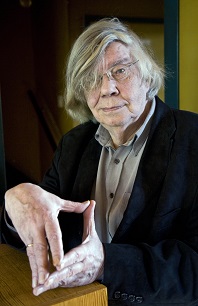
H.H. ter Balkt (Usselo, 17 september 1938)
De Amerikaanse dichter William Carlos Williams werd geboren in Rutherford (New Jersey) op 17 september 1883. Zie ook mijn blog van 17 september 2010 en eveneens alle tags voor William Carlos Williams op dit blog.
April
If you had come away with me
into another state
we had been quiet together.
But there the sun coming up
out of the nothing beyond the lake was
too low in the sky,
there was too great a pushing
against him,
too much of sumac buds, pink
in the head
with the clear gum upon them,
too many opening hearts of lilac leaves,
too many, too many swollen
limp poplar tassels on the
bare branches!
It was too strong in the air.
I had no rest against that
springtime!
The pounding of the hoofs on the
raw sods
stayed with me half through the night.
I awoke smiling but tired.
The Hunter
In the flashes and black shadows
of July
the days, locked in each other's arms,
seem still
so that squirrels and colored birds
go about at ease over
the branches and through the air.
Where will a shoulder split or
a forehead open and victory be?
Nowhere.
Both sides grow older.
And you may be sure
not one leaf will lift itself
from the ground
and become fast to a twig again.
Poem (As the cat)
As the cat
climbed over
the top of
the jamcloset
first the right
forefoot
carefully
then the hind
stepped down
into the pit of
the empty
flowerpot
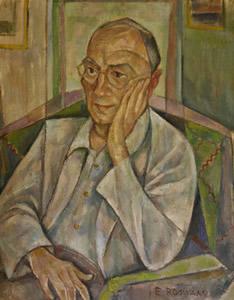
William Carlos Williams (17 september 1883 - 4 maart 1963)
Portret door Emmanuel Romano, 1959
De Amerikaanse schrijver Ken Kesey werd geboren in La Junta (Colorado) op 17 september 1935. Zie ook mijn blog van 17 september 2010 en eveneens alle tags voor Ken Kesey op dit blog.
Uit: One Flew Over the Cuckoo's Nest
“They showered me this morning at the courthouse and last night at the jail. And I swear I believe they'd of washed my ears for me on the taxi ride over if they coulda found the vacilities. Hoo boy, seems like everytime they ship me someplace I gotta get scrubbed down before, after, and during the operation. I'm gettin' so the sound of water makes me start gathering up my belongings. And get back away from me with that thermometer, Sam, and give me a minute to look my new home over; I never been in a Institute of Psychology before.'
The patients look at one another's puzzled faces, then back to the door, where his voice is still coming in. Talking louder'n you'd think he needed to if the black boys were anywhere near him. He sounds like he's way above them, talking down, like he's sailing fifty yards overhead, hollering at those below on the ground. He sounds big. I hear him coming down the hall, and he sounds big in the way he walks, and he sure don't slide; he's got iron on his heels and he rings it on the floor like horseshoes. He shows up in the door and stops and hitches his thumbs in his pockets, boots wide apart, and stands there with the guys looking at him.
'Good mornin', buddies.'
There's a paper Halloween bat hanging on a string above his head: he reaches up and flicks it so it spins around.
'Mighty nice fall day.'
He talks a little the way Papa used to, voice loud and full of hell, but he doesn't look like Papa; Papa was a full-blood Columbia Indian -a chief – and hard and shiny as a gunstock. This guy is redheaded with long red sideburns and a tangle of curls out from under his cap, been needing cut a long time, and he's broad as Papa was tall, broad across the jaw and shoulders and chest, a broad white devilish grin, and he's hard in a different kind of way from Papa kind of the way a baseball is hard under the scuffed leather. A seam runs across his nose and one cheekbone where somebody laid him a good one in a fight, and the stitches are still in the seam.”
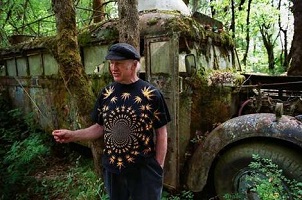
Ken Kesey (17 september 1935 – 10 november 2001)
Cover
De Nederlandse toneel- en kroniekschrijver en essayist Abel Herzberg werd geboren in Amsterdam op 17 september 1893. Zie ook mijn blog van 17 september 2010 en eveneens alle tags voor Abel Herzberg op dit blog.
Uit: Drie rode rozen
Fragment
Want alles is fragment
Al door het zeggen van het woord
Deelt men, scheidt men en schendt
Het alomvattende, dat men niet kent,
Dat ik aanwezig weet of alleen maar vermoed,
Dat ik niet uitspreken kan en toch uitspreken moet,
Dat mij beheerst en mij te luisteren gebiedt.
Maar als ik zoek en luister, dan vind ik het niet.
Een troost blijft:
Er is in ieder woord een woord,
Dat tot het onuitspreekbare behoort;
Er is in ieder deel een deel
Van het ondeelbare geheel,
Gelijk in elke kus, hoe kort,
Het hele leven meegegeven wordt.
Alles wat wij zijn
Alles wat wij zijn,
wat wij zien, ervaren, zeggen, beleven en doen
is fragment.
Maar er is geen fragment
of de ziel van al wat leeft
is daarin tot uiting gekomen.
Er is geen moment zonder eeuwigheid.
geen sterfelijk wezen, hoe mismaakt of welgevormd het ook mag zijn,
waarin niet de onsterfelijke schepping is geopenbaard.
Geen weldaad, geen misdaad, geen geest en geen stof, geen grens en geen duur
of het is bestanddeel van de eenheid van het bestaan.
Deze Eenheid is God,
En wij,
fragmenten als wij zijn en fragmenten die wij maken,
zijn niet in staat hem in beeld of in woord
en zelfs niet in gedachten te vatten.
En wij verlangen dat -
wij hunkeren ernaar.
Wij zijn niet tevreden met het fragment,
wij moeten de Eenheid beleven.
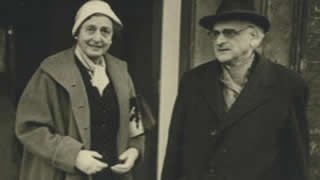
Abel Herzberg (17 september 1893 - Amsterdam, 19 mei 1989)
Hier met zijn vrouw
De Indiase dichter, schrijver, schilder en regisseur Dilip Purushottam Chitre werd geboren op 17 september 1938 in Baroda. Zie ook mijn blog van 17 september 2010 en eveneens alle tags voor Dilip Chitre op dit blog.
Father Returning Home
My father travels on the late evening train
Standing among silent commuters in the yellow light
Suburbs slide past his unseeing eyes
His shirt and pants are soggy and his black raincoat
Stained with mud and his bag stuffed with books
Is falling apart. His eyes dimmed by age
fade homeward through the humid monsoon night.
Now I can see him getting off the train
Like a word dropped from a long sentence.
He hurries across the length of the grey platform,
Crosses the railway line, enters the lane,
His chappals are sticky with mud, but he hurries onward.
Home again, I see him drinking weak tea,
Eating a stale chapati, reading a book.
He goes into the toilet to contemplate
Man's estrangement from a man-made world.
Coming out he trembles at the sink,
The cold water running over his brown hands,
A few droplets cling to the greying hairs on his wrists.
His sullen children have often refused to share
Jokes and secrets with him. He will now go to sleep
Listening to the static on the radio, dreaming
Of his ancestors and grandchildren, thinking
Of nomads entering a subcontinent through a narrow pass.
Your First Lover
An early wake-up call
your first lover
touches your shoulder
the rain has stopped
at last
a faint breeze
blows moisture
on your eyes
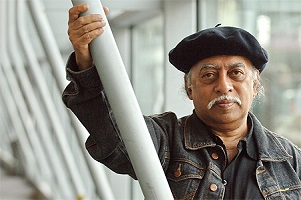
Dilip Chitre (17 september 1938 – 10 december 2009)
Zie voor nog meer schrijvers van de 17e september ook mijn blog van 17 september 2011 deel 2.
|



